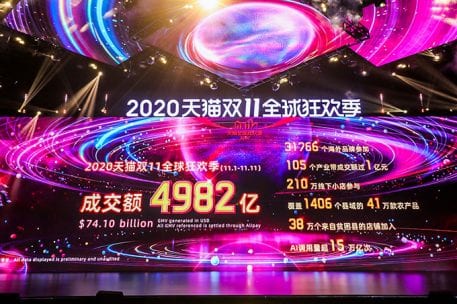Alibaba Single’s Day 2020: $74.1 Billion New Record Setting Performance
Alibaba’s Singles Day performance on Wednesday (Nov. 11) shows that the Chinese consumer is back — big time. Singles Day — Alibaba’s popular shopping holiday that takes place every Nov. 11 (“11-11”) in China and some other countries — saw online sales explode past last year’s sales totals.
Alibaba, China’s biggest (and lately its most controversial) company, said Singles Day sales totaled more than $74.1 billion. That’s up from $38.4 billion last year.

Alibaba Generates RMB498.2 billion (US$74.1 billion) in GMV during the 2020 11.11 Global Shopping Festival
However, the company technically started Singles “Day” on Nov. 3 this year, so the totals reflect more than a week of sales rather than just 24 hours.
Still, that performance was higher than the five days of U.S. online sales seen last year between Thanksgiving and Cyber Monday. U.S. shoppers spent a record $28.49 billion online during that period, according to Adobe Analytics data. More than $7.2 billion was spent on Black Friday; Cyber Monday generated $9.4 billion.
As for Singles Day, this year’s strong sales were notable not only for the records broken but also as a barometer of the Chinese consumer’s overall spending power. The big gains were a great sign that the Chinese economy — and more specifically, consumer spending — is on a post-COVID rebound.
“[Singles Day] has historically served as a very accurate indicator for what’s happening in the following year for retailers, brands as well as consumers,” said Jonathan Cheng, head of China retail at Bain & Co. “For this year, with COVID, it’ll become more important. And if you look at China, which is the first one to be coming out of COVID, it’s going to be an indicator for other countries as well.”
The event seems to have established itself as just that indicator — and American brands and celebrities were part of the action. Katy Perry sang at the pre-festival concert (appearing virtually), while U.S. brands from Apple to Nike made strong showings.
According to Bloomberg, “during the first 111 minutes of sales on Nov. 1, Nike Inc. and Apple Inc. were among 100 brands that reported 100 million yuan ($15 million) in transactions. And Estee Lauder’s flagship store on Alibaba’s Tmall platform was the first to surpass 1 billion yuan in sales, the e-commerce company said. International hotel groups Marriott International Inc. and Accor SA also passed the 1 billion yuan transaction mark for the first time.”
However, Alibaba’s Singles Day success was overshadowed by a precipitous 9.8 percent drop in its stock on the Hong Kong Stock Exchange. The stock fell after the Chinese government announced new antimonopoly rules that will increase the pressure on eCommerce marketplaces and payments services.
The regulations will also hit Alibaba’s Ant Group, which took a beating last week after the government suspended its planned initial public offering (IPO). Alibaba’s shares had already dropped sharply last week after that event.
The aim of China’s new regulatory proposal is reportedly “to prevent and stop monopolistic practices in internet platforms’ economic activity, to lower compliance costs for law enforcers and business operators, to enhance and improve antitrust regulations on the platform economy, to protect market fairness, to ensure the interests of consumers and society, and to encourage the healthy and continuous development of the platform economy.”
According to news site TechNode, the new rules will apply physical-economy statutes to the digital-first economy. For example, the definition of “relative market” means that companies in a “dominant position” if they control more than 50 percent of the market would come under the new regulations. Essentially, the new rules update the old antimonopoly laws which were passed in 2008.
“Legal experts have long criticized (in Chinese) the law because it was designed to regulate companies in traditional industries and, in most cases, did not apply to companies operating on the internet, an increasingly important segment of the country’s economy,” said TechNode. “The new rules expanded the parameters for determining market share to include factors such as transaction volume, user base, and page views.”